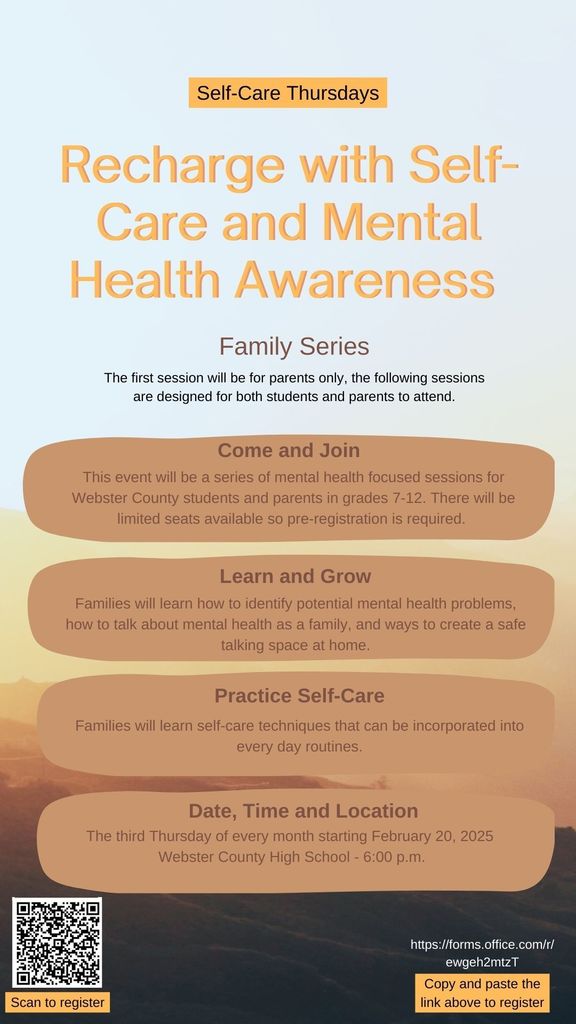We want to hear from you! Please remember to complete the family engagement survey to provide input into the upcoming year's strategic plan. The survey closes Monday, April 14th. The survey is accessible at https://forms.office.com/r/cdDUQtjBdR or through the QR code. Your input is important, so please tell us what you think.

This is the last chance to nominate a Teacher or Service Person of the Year. Nominations close Sunday, April 13th, so don't miss out. Teachers can be nominated at: https://forms.office.com/r/WnZx1hzWzb.
Service Personnel can be nominated at: https://forms.office.com/r/SdQegEJnJp
We're excited to announce that registration for Summer SOLE is now open. Students interested in attending need to register before April 18th. Students may register at https://forms.office.com/r/7brZcajBeQ or by scanning the QR code.

Parenting can be challenging and, at times, feel isolating. Parent coaching is here to provide support during those tough moments. Offered at no cost by your school district, parent coaching connects you with a coach and resources developed by therapists. Click here to sign up for ongoing support: https://cookcenter.info/coaching

Webster County Service Person of the Year nominations are now open. The survey should take less than 2 minutes to complete and is available at https://forms.office.com/r/SdQegEJnJp. Nominate a bus driver, cook, custodian, secretary, aide, maintenance worker, or mechanic. Please submit your nomination by Sunday, April 13, 2025.

Webster County Teacher of the Year nominations are now open. The survey should take less than 2 minutes to complete and is available at https://forms.office.com/r/WnZx1hzWzb. Please submit your nomination by Sunday, April 13, 2025.

Parent guidance offers free coaching to families., no insurance information is required. Coaches check in weekly or bi-weekly with families during a desired time that works for the family. At this time, we have very few families utilizing this free resource. Please check out parentguidance.org to see all the resources offered or register for coaching using the QR code or visiting https://cookcenter.info/coaching

Happy Monday! See you at school. #9isfinebutlessisprime #attendancematters

Parent guidance offers free coaching to families., no insurance information is required. Coaches check in weekly or bi-weekly with families during a desired time that works for the family.
At this time, we have very few families utilizing this free resource. Please check out parentguidance.org to see all the resources offered or register for coaching using the QR code or visiting https://cookcenter.info/coaching

There will be a volunteer training with fingerprints/ background checks on Tuesday, February 25th at 6:00 at Webster County High School. Please make sure to fill out the Volunteer Application online.

Canceled due to 0 registrations.

The deadline for submitting the Promise Scholarship application and FAFSA is Saturday, March 1, by 11:59 pm. There will not be an extension this year. Students can review their status by logging into their WVSAM account. Please contact your school counselor if you need help.
WCHS student council is sponsoring a comfort campaign. They are collecting new pillows and new or gently used pillowcases and blankets to donate to local children. Donations can be dropped off at Webster County High or given to any student council member until March 7, 2025.

Webster County middle and high school families,
Please join us for a family engagement series focused on mental health and well-being. You must pre-register for this event. The first session will be for parents only, the following sessions will be for both parents and students to attend together.

Good evening. This is an important announcement regarding a bus cancellation for tomorrow Monday January 27th. Bus 03 in the Webster Springs area will not be running in the morning or evening. Again bus 03 will not be running tomorrow Monday 27th. Thank you. Have a good evening.
We will see you back on January 2, 2025.

🎄✨ Holiday Tree Voting Update! ✨🎄
The competition is heating up at WCHS! 🌟 There's still time to vote for your favorite tree and change the standings!
🎉 Current Standings as of December 13th:
🥇 1st: 8th Grade – Candyland 🍬
🥈 2nd (Tied): 7th Grade – Nutcrackers 🎁 & 9th Grade – Country Western Hillbilly 🤠
💰 How to Vote:
Drop ANY amount into the locked metal box for your favorite tree in the Commons Area. The grade with the most votes wins a prize AND gets to donate all funds to a charity of their choice!
🎄 Themes:
7th: Nutcrackers 🎁 | 8th: Candyland 🍬 | 9th: Hillbilly 🤠
10th: Willy Wonka 🍫 | 11th: Toy Story 🧸 | 12th: Nightmare Before Christmas 🎃
🌟 Staff Tree: Decorated with teacher-themed ornaments!
🗳️ Voting ends Dec. 18—help us make this season bright by voting and giving back!
#HolidayTreeChallenge #WCHSHighlanderPride #VoteNow






Just a reminder for all homeschool families. An assessment is required annually and must be retained by the parent for at least three years. If you would like your child to participate in the WV Summative Assessment programs (WVGSA for grades 3-8 or College Board's SAT School Day for grade 11), you must submit the Request to Participate form no later than Thursday, December 12th, 2024. For a student to participate in the WVGSA 3-8 or the Digital SAT School Day exams they must be approved, and the WVDE must upload their data into the assessment platforms. You may register to participate at the following link: https://forms.office.com/r/Yrp3cydtsv
Webster County Schools is actively working to improve our attendance rate. We would like to partner with families to create a culture of attendance. The goal for WC students is to have an attendance rate of 95%. If your student has missed more than 3 days so far this year, their attendance rate is below 95%, this includes excused and unexcused absences. The chart shows the average attendance rate for each school. By the end of the semester, we would like to see each school's average attendance be above the 95% mark.
Please talk with your students about the importance of attendance. To help eliminate challenges around absenteeism, assess your child's sleep schedule, nutritional diet, physical and mental health, as well as time spent on electronics. If you need assistance with any of these challenges, please reach out to your school social worker or counselor. Our staff will help create a plan of action to help your child reach the goal of success. #9isfinebutlessisprime #attendancematters #strivefor95

Coaching for parents resource.

